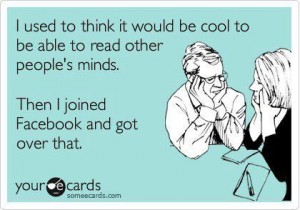It’s not enough to make meaning anymore. Because we aren’t sure it really is meaning. Unless, of course, we photograph it, put it on social media, and get approval. Then we’ve made meaning.

Crescent moon moving closer to Venus on a dark, February night. I saw it because I was outside. In the dark.
Popular culture shifts and changes–that’s what defines pop culture. But the biggest change in our lives (from my observation), is that something has to be photographed (or videod) and put online for it to matter. Somehow, we can’t have private meaning anymore. In fact, we can’t really be alone any more.
Without “likes” and comments, even negative ones, what we do doesn’t feel real, doesn’t matter.
That’s why, when we see something surprising, beautiful, alarming, horrifying, we immediately grab out camera and experience it though our phones. Then post it. We crowd-source our emotions, our experiences, and eventually, our meaning-making. If people object, we change our minds. Maybe we didn’t have as much fun as we thought. Maybe we didn’t like that movie as much. Or maybe it was much more, depending on what reactions we get.
Some people I know Tweet all their reactions to watching TV. They post 20-60 tweets while watching Downton Abbey or the Oscars, waiting for friends to react to the show and the other tweets, to create an emotional background they cannot seem to create alone.
In a recent study, published by the Journal Science (and reviewed here in Time magazine) 67 percent of men and 25 percent of women would rather receive electric shocks (which they administer themselves) than be alone with their own thoughts.
We no longer trust our own emotions. We don’t even want to have them. We want approval so much more, that we are willing to put the most intimate parts of our life online and get a reaction to them, to validate ourselves. This weekend, I watched people post the following events online:
- the death of a relative (with photos of the dead person)
- a selfie of a crying woman (“I’m so sad right now.”)
- the birth of a baby at home (with a photo of the emerging head)
- new tattoos (complete with blood still flowing)
- two FB posts from different emergency rooms
- one FB post from an ambulance
 At some time, each of these events would have been thought of as too private to share. In fact, years ago, most people would have preferred to process the comlex emotions of these events with family (or alone) and not mention them to others until some time has passed. Not anymore. We aren’t real unless we are online.
At some time, each of these events would have been thought of as too private to share. In fact, years ago, most people would have preferred to process the comlex emotions of these events with family (or alone) and not mention them to others until some time has passed. Not anymore. We aren’t real unless we are online.
I’m amazed (and will admit to being the right demographic for amazement) that we are so willing to give up every shred of privacy to validate our emotions. I’m not there yet.
Is it really so bad to have something happen unshared? Unphotographed? Undocumented? Do we not know what to feel until our FB friends tell us? I’ve quit posting my Sketchbook homework not because I don’t want to share, but because I want to experience what I feel about it before others tell me. It’s OK not to like something and not say anything. Or to enjoy it without sharing. Sometimes, it’s wonderful to not share your thoughts.
––Quinn McDonald feels completely OK making meaning on her own and not sharing it.